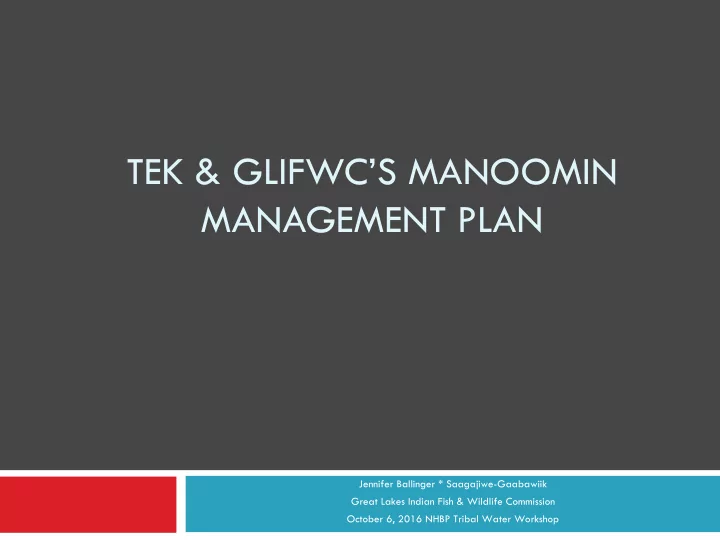

TEK & GLIFWC’S MANOOMIN MANAGEMENT PLAN Jennifer Ballinger * Saagajiwe-Gaabawiik Great Lakes Indian Fish & Wildlife Commission October 6, 2016 NHBP Tribal Water Workshop
GLIFWC manoomin management Why is GLIFWC creating a new manoomin plan? TEK foundation and tribal perspective “A TEK Assessment of Manoomin Waters in the Lake Superior Basin” GRLI Project Determine where manoomin has been lost Compile observations about changes in manoomin & habitat Identify issues that hinder manoomin sustainability Record waterbody-specific recommendations for manoomin restoration, enhancement & protection Facilitate meeting with GLIFWC member tribes’ THPOs
What is Traditional Ecological Knowledge? Components of GLIFWC’s working definition Knowledge gained from intimate relationship with environment Place specific Based on direct observation over hundreds, thousands years Origin stories of resources Species distribution Best management practices Spiritual respect Harvesting experiences Best techniques Cause and effect observations
Sources of TEK Tribal elders & Traditionally passed harvesters on orally through: Aadizookaanan- sacred stories Written sources Izhitwaawinan- Contemporary works practices (Thomas Vennum, Dibaajimowinan- oral Maude Kegg) stories Historic ethnography Nagamonan- songs (William Warren, Ceremonies Frances Densmore)
Best Practices for Collecting TEK Determine what info is Respect needed Proper way to ask for help Inventory written works Patience ID community members Gratitude for sharing Interviews, meetings, Compensation talking circles The knowledge holder is the owner of the information
Manoomin Interviews Assessing historical information of manoomin waters in the Lake Superior basin TEK used to enhance previous data Interviews of elders & harvesters Historical distribution 4 questions Recording permission Don’t be pushy Be patient Permissions of use
TEK Analysis Transcript review Clarifications & additional information Respecting the TEK holder Report review Internal use Source attribution Quotes, paraphrases Desired citation Approval for other uses of TEK
Examples of Sharing Manoomin TEK Traditional Ecological Knowledge (TEK) Assessment of Manoomin waters in the Lake Superior Basin Summary, Report to EPA “TEK, Elders to form backbone of new manoomin plan” Mazina’igan , Dagwaagin 2016 Future manoomin plan
TEK Assessment of Manoomin Waters in the Lake Superior Basin Summary 11 interviews with 14 Threats to manoomin: individuals & THPO Climate change meeting Habitat changes in manoomin waters Cultural & spiritual important of Water level changes Invasive species manoomin Water quality Ojibwe migration story Accessibility to Health benefits manoomin beds Manoomin harvesting Spiritual components & Anishinaabe identity
TEK Assessment of Manoomin Waters in the Lake Superior Basin Summary (cont.) Recommendations for future manoomin work Incorporate spirituality Outreach & education to tribal and non-tribal public Advocate for manoomin when co-managing with other agencies Recommendations from THPO meeting Encourage tribes to include manoomin waters on traditional cultural properties & National Register of Historic Places Get Anishinaabekwe involved in manoomin management Assess state agencies’ manoomin management practices
The Manoomin Plan Inter-departmental development Acknowledgement of sources Ways of incorporating proper respect of manoomin Asemaakewin (Tobacco Offerings) Wiikongewin (Feasting) Continuation of interviews
Miigwech bizindawiyeg Jennifer Ballinger * Saagajiwe-Gaabawiik Outreach Specialist Great Lakes Indian Fish & Wildlife Commission Environmental Section jballinger@glifwc.org (715) 682-6619 ext. 2115
Recommend
More recommend